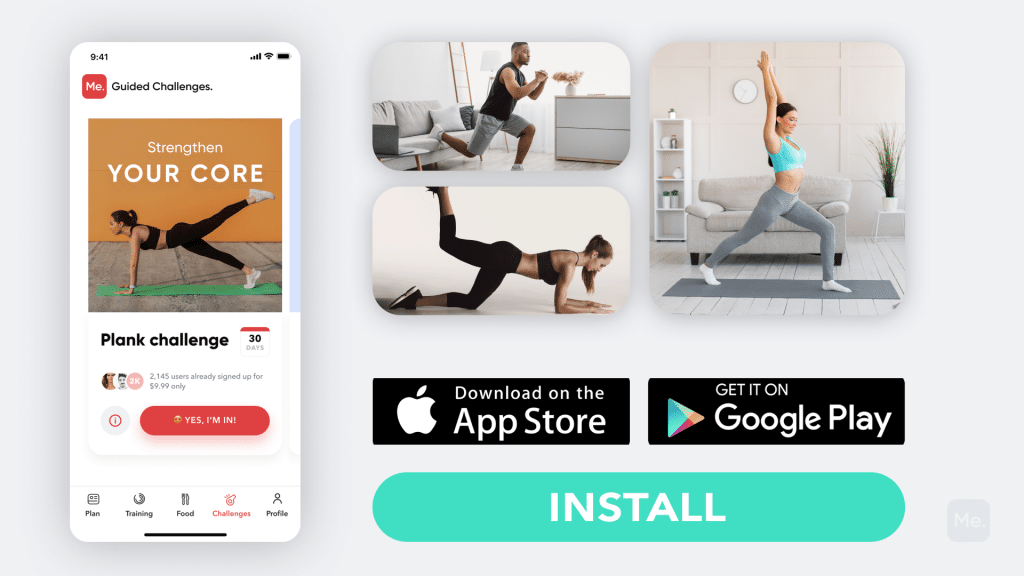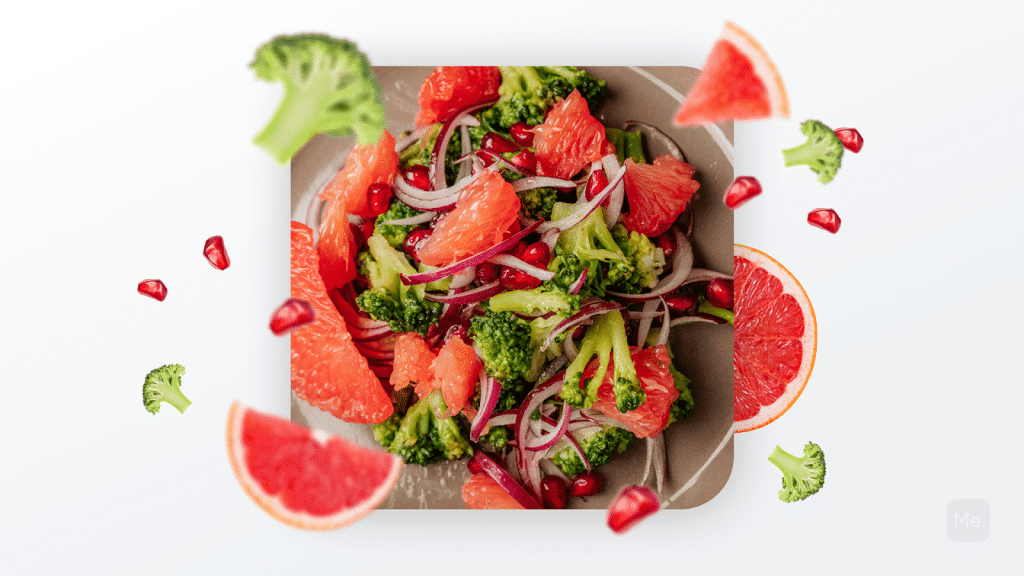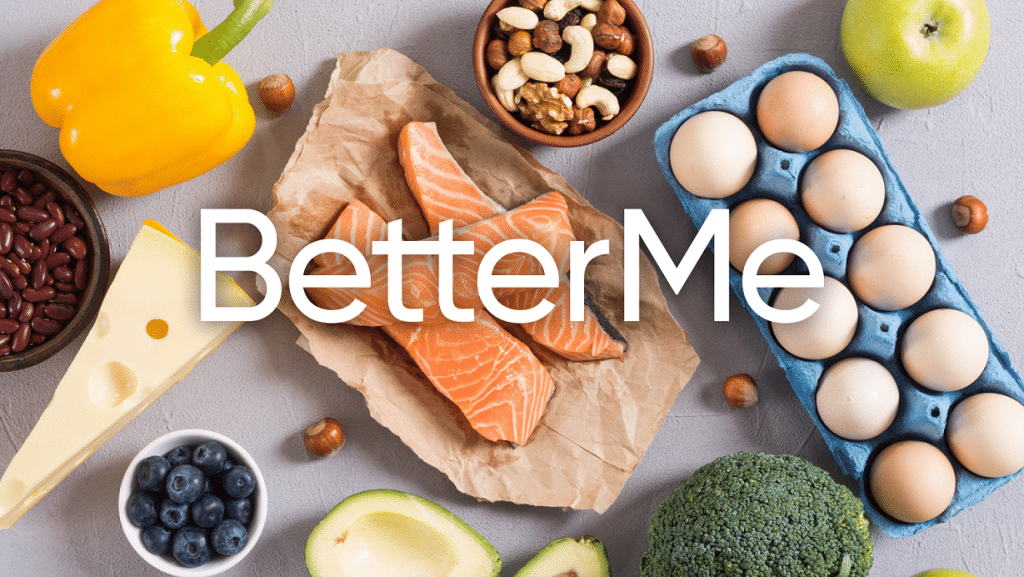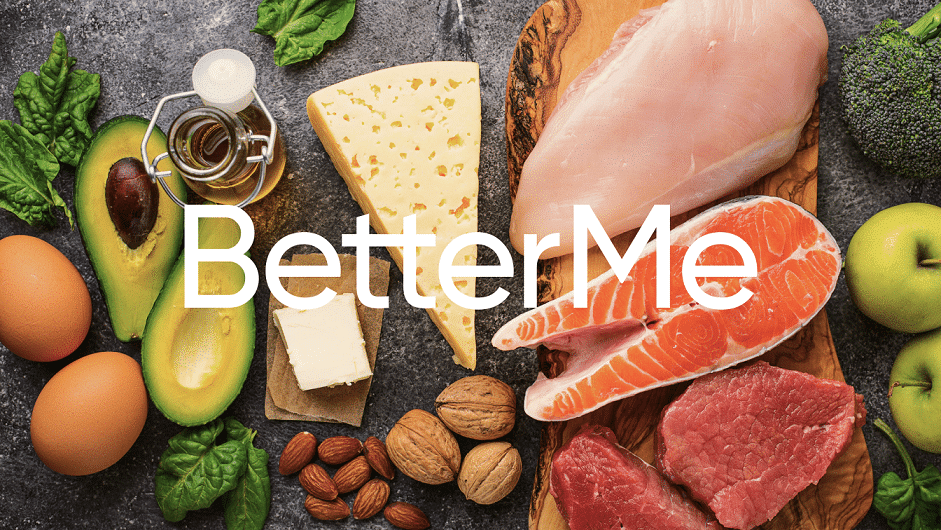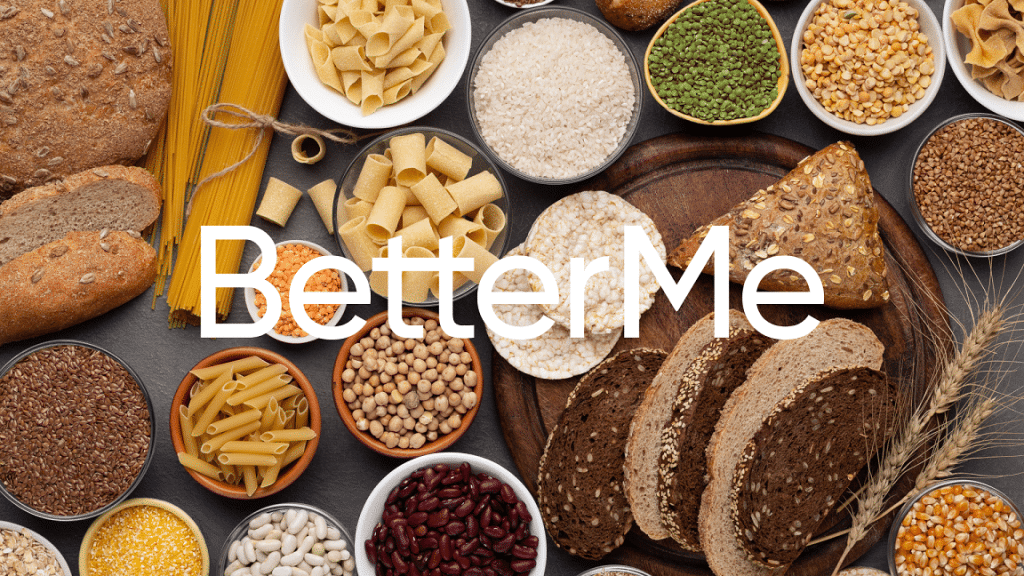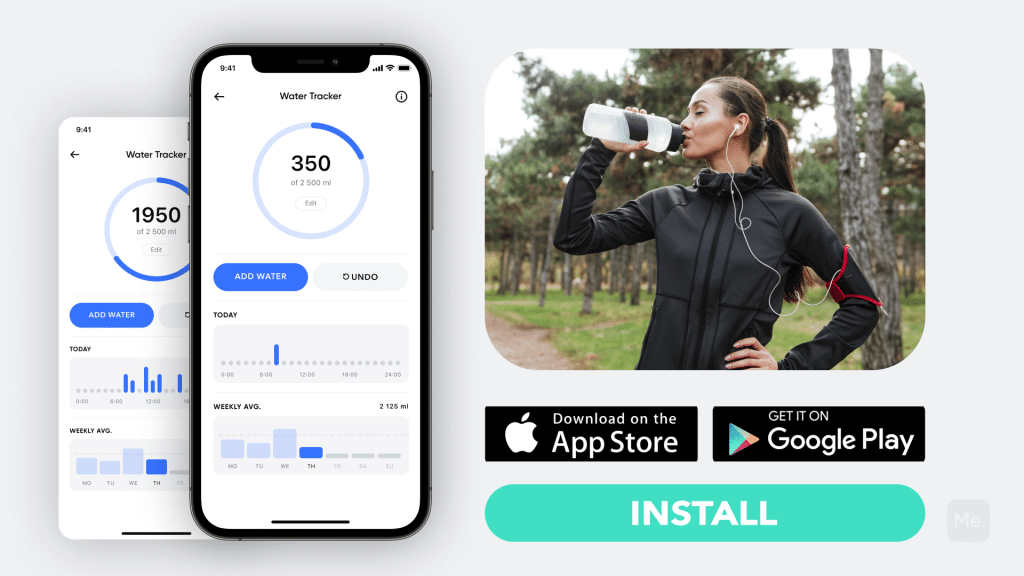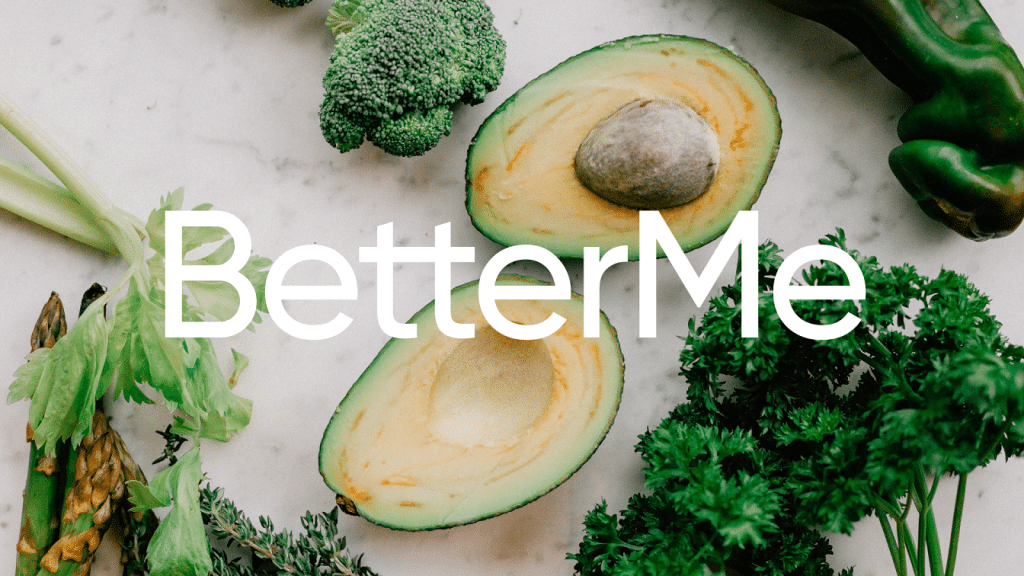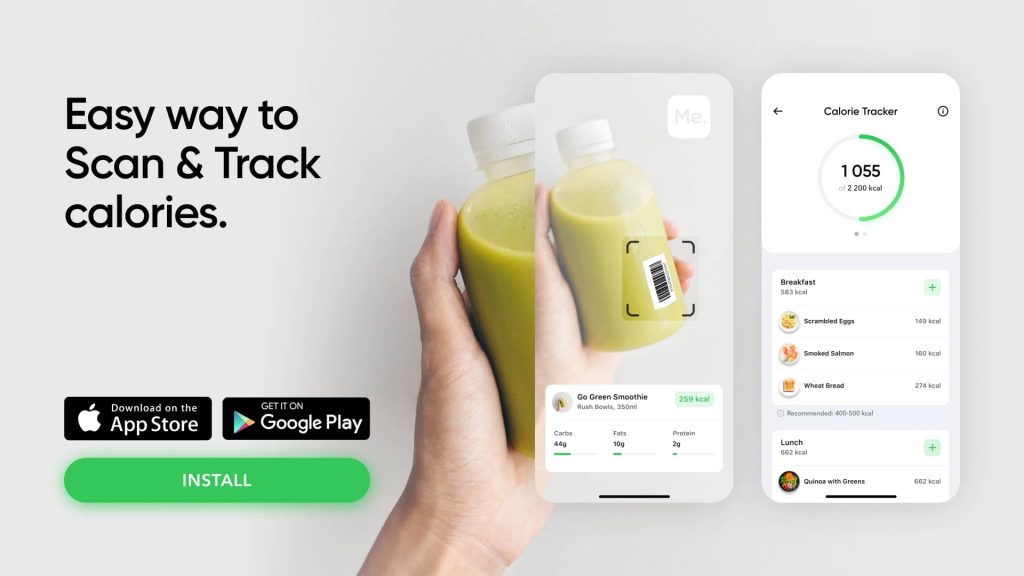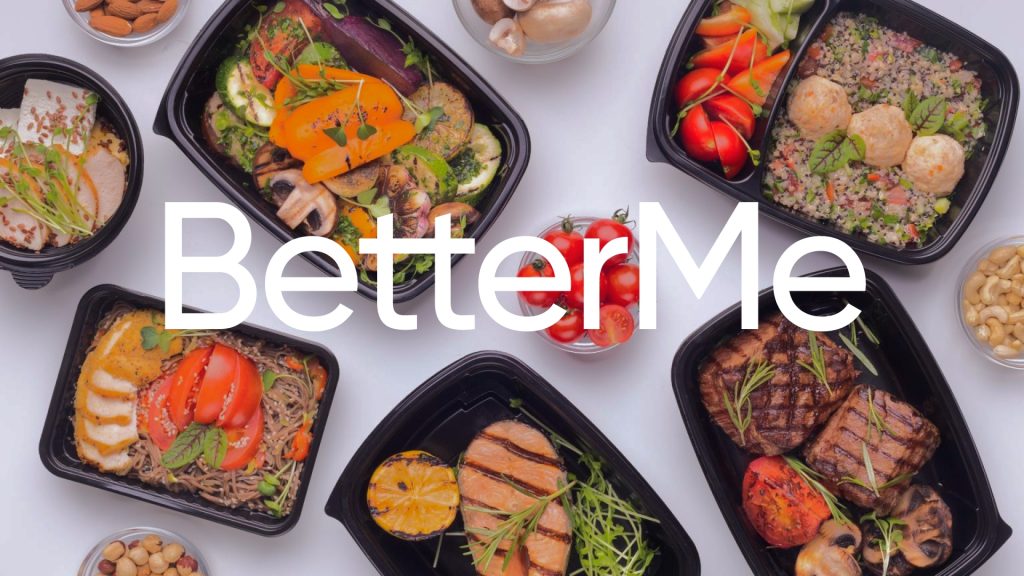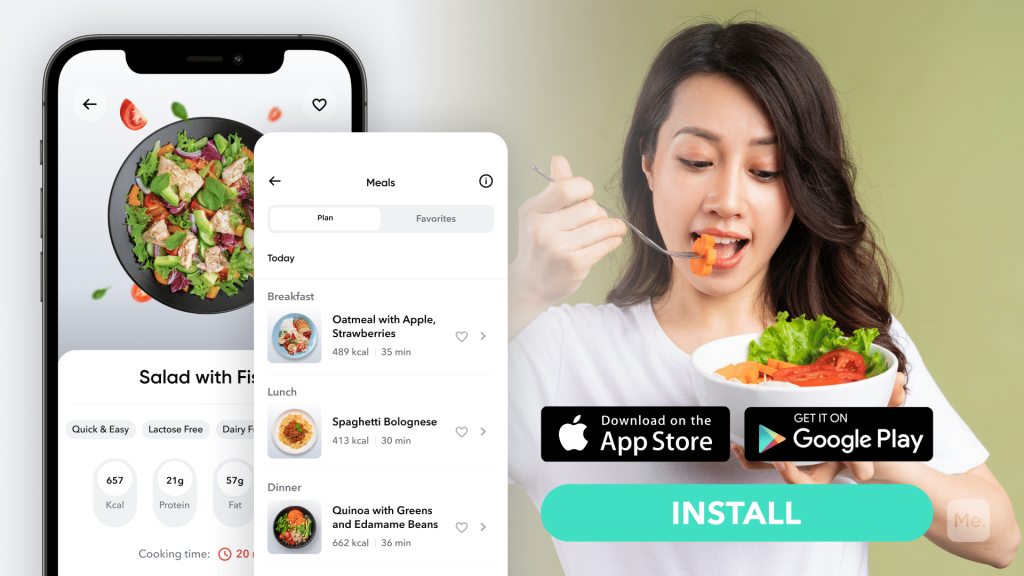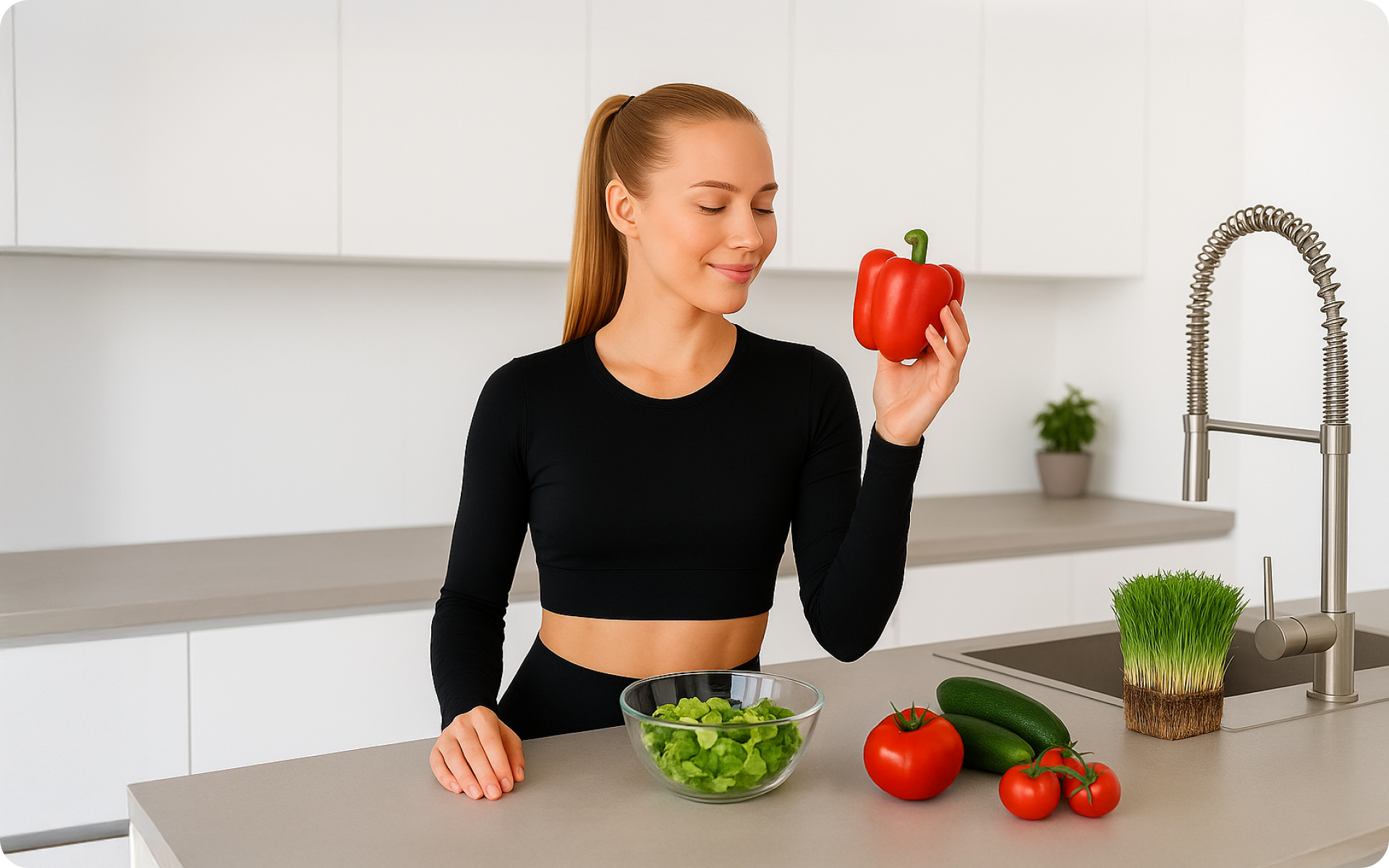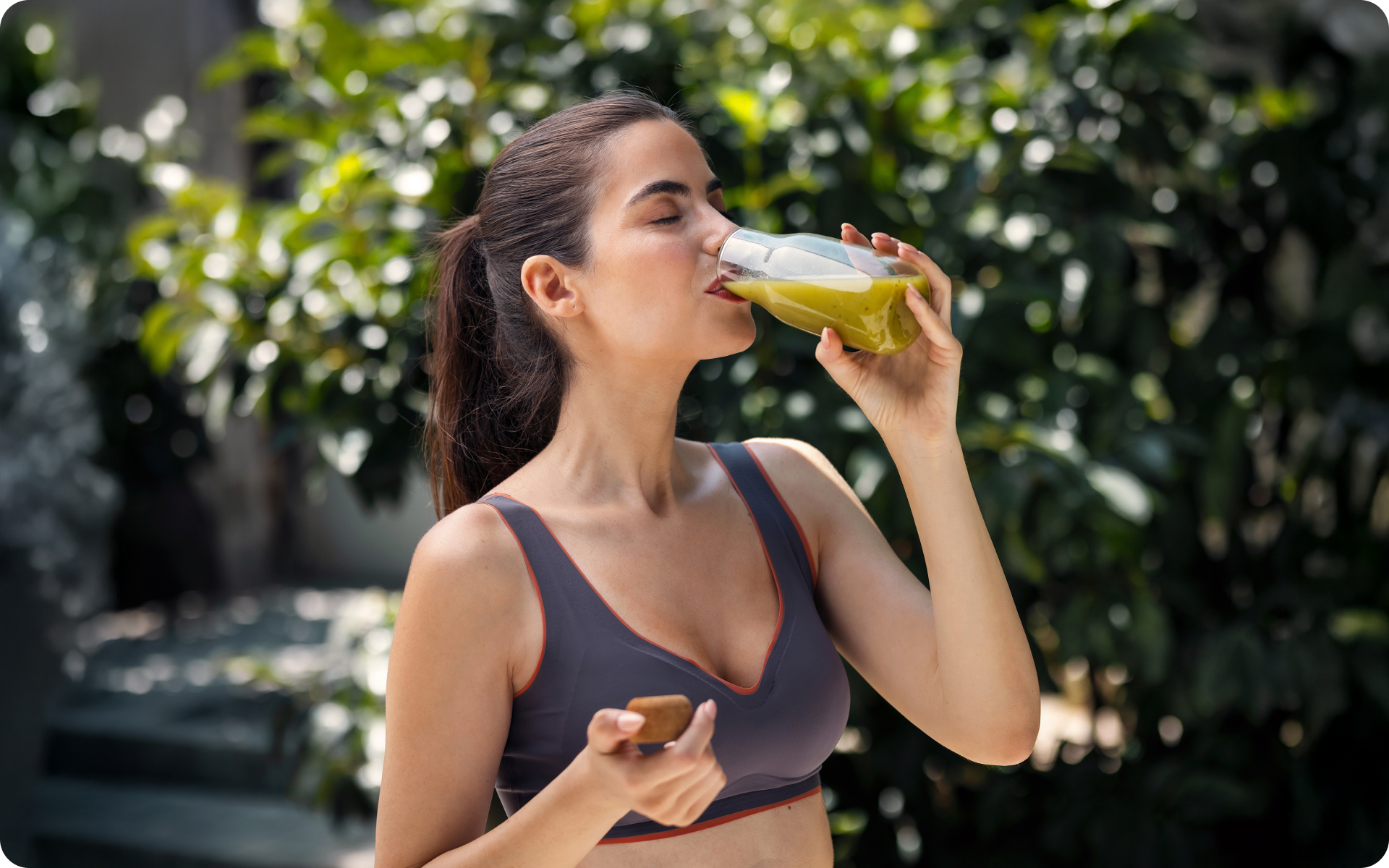What is the best weight loss program?
With a great abundance of different diets online, choosing which one will help you lose weight, without wreaking havoc on your body and health may be difficult. You may feel lost in this world of dietary rules and recommendations, as you can’t be sure if what a diet promises will really work on your body, without causing any negative side effects in form of weight regain, or worse – nutritional deficits or even certain diseases. To understand which one will be the best weight loss program for you, first, you have to figure out what exactly you and your body need. In this article, you will find out how to choose a diet and will learn about the main features of a healthy nutritional plan which will help you improve your wellness, shed pounds, and maintain your target weight, without drastically changing your eating habits.
Get your personalized
meal plan!

How to choose the best weight loss program?
Everyone is different, and every body reacts to certain changes in its own way. That is why you can’t predict for certain what will work best for you, intermittent fasting, Mediterranean diet, or Keto diet, without a consultation with a dietitian or if you haven’t tried to follow these nutrition plans in the past. So, you may ask, how can you choose the best weight loss program then? There are a couple of aspects on which you should focus while choosing a diet (9, 1):
-
Weight loss pace
Although a lot of people find a promise of rapid weight loss highly alluring, such an approach rarely bears positive results (13). A rapid weight loss is not supported by nutritionists and doctors, as usually it is reached by a critical limitation of food, which may lead to a nutrient deficiency and a yo-yo effect.
Another way of fast weight loss is when you lose water weight. Such a result is very short-lasting and doesn’t carry any health benefits, moreover, it may cause dehydration, which in turn may lead to headaches, lethargy, and constipation (18).
So, it is better to lose weight slowly but surely. For people whose initial weight is on the level of obesity, in the beginning, the pace of the weight loss may be quite fast, but that is ok, and the closer the person will get to their normal weight, the slower the fat burning process will become. The recommended weight loss pace is 1-2 pounds (0.5-1kg) per week (19).
Read More: Yoga Poses For Weight Loss: Get In Shape And Lose Belly Fat With These Simple Asanas
-
Nutritional value
Each diet is based on a certain principle. Some are focused on the restriction of carbs, some reduce the consumption of fats, some cut the overall calorie intake. When choosing a diet, you should bear in mind, that everything has its purpose, and all nutrients are vital and have an important role in the maintenance of the processes of your body. That is why, completely excluding a certain macronutrient from your diet may have negative consequences. The ultimate healthy dietary plan is well-balanced and includes all the nutrients in a healthy proportion (6). You can adjust the percentage of the nutrients which you consume, reducing the amount of those that may lead to weight gain, and increasing the intake of those that promote health and fat burning.
-
Allergies and diseases
It may sound pretty simple and obvious, but it should be stated, that your diet should never trigger your allergy, or complicate your diseases in any way. If you have a gluten allergy – you should focus on a gluten-free diet, or a combination of gluten-free and Mediterranean diet; if you are lactose intolerant – the lactose-free diet is perfect for you; if you are under the risk of developing, or already suffer from diabetes – you can try a low glycemic index (GI) diet. Likewise, if you are allergic to fish, the before-mentioned Mediterranean diet should be excluded from your dieting options right away, as fish plays one of the prominent roles in this dietary plan (17).
You can also adjust your diet to your needs, substituting the harmful components with their safe equivalents. For example, if you have a peanut allergy, excluding all the foods that may have even the slightest amount of this nut from the keto or low GI (12) diet will not be a problem, as it doesn’t contain any hard-to-get nutrients and may easily be banished from your diet.
-
Medical/scientific opinion
There is no doubt, that the best weight loss program, is the one that a dietitian created for you personally. However, if you are searching for a diet online and want to choose one yourself, one thing that you should do is check if the diet is approved by medical experts and scientists. There are lots of suspicious, to say the least, diets, which may not only bring no positive results, but also be of great danger to the proper functioning of your body. It was mentioned before, that a diet has to be nutritionally complete, therefore, if you find a long-lasting, highly limiting mono-diet (based on only one type of food (7)), no matter how healthy that one food is, you can rest assured that it won’t be approved by a specialist and should be avoided.
-
Your preference and financial means
Your personal taste also plays a big role when it comes to dieting. You should take into account which types of food you prefer and will be eager to eat, and which ones you can easily exclude from your daily menu.
Last but not least, not every person can afford a costly diet. As some of the existing nutritional plans which include a lot of supplements are quite pricey, you should also consider if you are determined to spend that much money on the diet, or better choose something else.
The best weight loss program
You can find or create your own nutritional plan, considering all the above-listed factors, or you can change your eating habits and make sure that you follow an overall beneficial and healthy diet. The best weight loss program is a long-term well-balanced nutritional plan, which creates a caloric deficit. The latter is the base of any diet that aims at slimming down. It can be reached by the reduction of the calorie intake and increase in physical activity so that you burn more calories than you consume and start to shed excess pounds. Any weight loss plan that creates enough of a calorie deficit (experts recommend a deficit 500-750 calories per day) is likely to produce meaningful weight loss. So, the key to a safe and sustainable weight loss is to stay in a caloric deficit until you reach your target weight and continue to eat healthy while you achieve your goals and beyond.
If you’ve mustered up the courage to crush your weight loss goal, let Betterme take the sting out of this demanding process. Our app will help you restructure your habits, remold your life and crank up your fitness results!
What to eat?
As was mentioned before, a well-balanced diet includes all the nutrients, as they are vital for your body. There are 6 essential nutrients – water, protein, carbohydrates, fats, vitamins, and minerals (11). All the nutrients are divided into 2 groups – macronutrients and micronutrients. The first group consists of proteins, carbs, fats, and water, while the second includes minerals and vitamins. The latter are divided into fat-soluble and water-soluble vitamins (16). So, a healthy diet includes different foods which contain all the nutrients, such as:
Protein
Proteins are building blocks of your body. They consist of amino acids and without them, the cells would not function properly. There are around 20 amino acids, which take part in the synthesis of protein and other compounds vital for human body. Protein foods can be divided into three groups (5):
-
Complete
Complete proteins contain all the vital amino acids and can be found in meat, eggs, dairy, and other animal foods. Plant-based sources of complete proteins include soy and quinoa.
-
Incomplete
Incomplete proteins contain at least one essential amino acid and are present in plant foods, such as legumes (peas and beans) and grains.
-
Complementary
These are two or more incomplete proteins, which in combination supply you with complete proteins, as for example, bread and peanut butter or rice and beans.
Proteins may improve your weight loss processes, by preserving your muscles, while your body burns fat. The required daily intake of proteins depends on your age, sex, and level of physical activity. If you exercise more, you need to increase the consumption of protein. To calculate the recommended daily allowance of protein multiply your weight in kilos by 0.8g (in pounds by 0.36) (4).
To improve your health and help you melt fat, your diet should include such protein-rich foods as:
- Legumes
- Nuts and seeds
- Whole grains
- Mushrooms
- Poultry
- Fish and shellfish
- Eggs
- Dairy products
Fats
Although the first thought that springs to mind when someone says fats is that you should reduce their consumption in the first place when you want to drop some weight. However, not all fats are bad for you. There are so-called healthy and unhealthy dietary fats. Healthy fats include primarily unsaturated fats (2), such as monounsaturated fatty acids, polyunsaturated fatty acids, and omega-3 fatty acids. Consumption of the first two types of fat instead of unhealthy ones may decrease your cholesterol level and lower the risk of heart disease, and omega-3 fatty acids, which is a type of polyunsaturated fatty acids, may decrease the risk of coronary artery disease. Therefore, the best weight loss program should definitely include them. You can find these types of fat in the following foods.
Monounsaturated fatty acids (MUFAs) (10):
- Olive oil
- Canola oil
- Peanut oil
- Nuts (almonds, cashews, pecans, and macadamia)
- Nut butters
- Avocadoes
- Olives
Polyunsaturated fatty acids (PUFAs) (3):
- Corn oil
- Soybean oil
- Sunflower oil
- Flaxseed oil*
- Seeds (chia, sunflower, and flax*)
- Fish* (salmon, mackerel, herring, trout, and others)
- Walnuts* and butternuts
*Rich source of omega-3 fatty acids
Carbs
Carbohydrates are one of your body’s main sources of energy. There are two types of carbs – simple and complex. Complex carbohydrates are considered to be the healthiest and they are used by your body to support the immune and nervous systems, brain and digestive functions, and as a source of energy to perform different tasks. It is recommended, that your daily calorie intake should consist of complex carbs on 45-65%. They include fiber and starch, which can aid in weight loss, as they prolong the feeling of satiation. The main sources of complex carbs are (15):
- Fruits
- Vegetables
- Peas
- Beans
- Brown rice
- Oatmeal
- Barley
- Quinoa
- Whole grain products (pasta, cereal, bread, and other baked goods).
Despite complex carbs being the healthiest among all carbs, in general, to lose weight, many people cut back on the consumption of carb-heavy foods. Eating vegetables can be a great idea if your goal is to slim down, as they are also rich in micronutrients. Some of the most low-carb vegetables include:
| Low-carb vegetables | Low-carb vegetables | Low-carb vegetables | Low-carb vegetables |
|---|---|---|---|
| Mushrooms | Spinach | Garlic | Radishes |
| Broccoli | Zucchini | Green beans | Tomatoes |
| Red bell pepper | Avocado | Brussels sprouts | Onions |
| Asparagus | Kale | Cucumber | Celery |
| Cauliflower | Lettuce | Eggplant | Cabbage |
Water
Our body mostly consists of water. Drinking plenty of water can be highly beneficial not only for weight loss but also for your body in general. It doesn’t have to be only plain water, as there are a lot of great sources of water among foods, such as fruits and vegetables, berries, dairy, meats, and others. On average a person should drink around 2 liters or 67 fluid ounces of water per day, but the required amount varies depending on such factors as age, sex, level of physical activity, the climate in which a person lives, and others. So, the best variant is to drink when you feel thirsty (8). You can also monitor the color and frequency of your urine to gauge whether you are hydrated enough.
Reasons why BetterMe is a safe bet: a wide range of calorie-blasting workouts, finger-licking recipes, 24/7 support, challenges that’ll keep you on your best game, and that just scratches the surface! Start using our app and watch the magic happen.
Vitamins
Vitamins are essential micronutrients which your body doesn’t produce enough. Therefore, you should consume them with your food, in order to support a healthy body and proper functioning of all your organs. There are 13 vitamins, which are divided into two groups (14):
Fat-soluble vitamins
The vitamins of this type are named so because they are stored in the fatty tissues of the body and are absorbed through the intestinal tract with the help of fats, or lipids. They are easier to store and can stay in the body for weeks and even months. Fat-soluble vitamins include:
- Vitamin A (retinol, retinal, and four carotenoids) can be found in beef liver, spinach, sweet potato, carrots, and others. Recommended daily value (DV) for adults is 900 mcg retinol activity equivalents (RAE) for men and 700 mcg for women.
- Vitamin D (ergocalciferol, cholecalciferol) your skin produces vitamin D when it is exposed to sunlight, it also occurs in fatty fish, eggs, beef liver, and mushrooms. Recommended DV for adults is 600 international units (IU) for both men and women.
- Vitamin E (tocopherols, tocotrienols) is present in almonds, avocado, eggs, milk kiwi fruit, leafy vegetables, whole grains, and others. Recommended DV for adults is 15mg for both men and women.
- Vitamin K (phylloquinone, menaquinones) is found in parsley, leafy greens, soybeans, and avocado. Recommended DV for adults is 120mcg for men and 90 mcg for women.
Water-soluble vitamins
Water-soluble vitamins do not remain in your body for long and are quickly excreted in the urine. Due to this factor, they require replacement more often, than the fat-soluble ones. They include all the B vitamins and vitamin C:
- Vitamin B (Thiamine) is present in brown rice, asparagus, kale, liver, eggs, potatoes, oranges, pork, sunflower seeds, and others. Recommended DV for adults is 1.2mg for men and 1.1mg for women.
- Vitamin B2 (Riboflavin) occurs in bananas, chard, cottage cheese, milk, yogurt, meat, fish, eggs, asparagus, green beans, and others. Recommended DV for adults is 1.3mg for men and 1.1mg for women.
- Vitamin B3 (Niacin, niacinamide) is found in milk, eggs, kidney, liver, heart, tuna, salmon, dates, tomatoes, avocadoes, carrots, broccoli, sweet potatoes, asparagus, nuts, whole-grains, mushrooms, legumes and others. Recommended DV for adults is 16 mg for men and 14mg for women.
- Vitamin B5 (Pantothenic acid) is present in sunflower seeds, beef liver, shiitake mushroom, chicken, tuna, avocado, and others. Recommended DV for adults is 5mg for both men and women.
Water-soluble vitamins (part 2)
- Vitamin B6 (Pyridoxamine, pyridoxal) occurs in chickpeas, beef liver, potatoes, chicken breast, tuna, and others. Recommended DV for adults is 1.3mg for both men and women.
- Vitamin B7 (Biotin) can be found in beef liver, eggs, salmon, sweet potato, and sunflower seeds. Recommended DV for adults is 30 mcg for both men and women.
- Vitamin B9 (Folic acid, folate) is present in legumes, beef liver, sunflower seeds, leafy vegetables, and others. Recommended DV for adults is 400mcg for both men and women.
- Vitamin B12 (Cyanocobalamin, hydroxocobalamin, methylcobalamin) is found in clams, liver, plant milk, some oily fish, fortified yeasts, and others. Recommended DV for adults is 2.4mcg for both men and women.
- Vitamin C (Ascorbic acid) – occurs in citrus fruits, berries, broccoli, red and green bell peppers, kiwi fruit, and others. Recommended DV for adults is 90mg for men and 75mg for women.
Read More: Do Vitamins Break A Fast: Exploring The Impact Of Supplements On Fasting
Minerals
Another type of micronutrient – minerals, are also a vital component of your diet. There are two types of minerals, and their balance is essential for your health.
-
Major minerals
This group of minerals improves your hair, nails, and skin, promotes bone health, and balances water levels. Major minerals include calcium, chloride, magnesium, phosphorus, potassium, sodium, and sulfur.
-
Trace minerals
These minerals support the immune system and healthy blood pressure, help to carry oxygen, aid in blood clotting and preventing tooth decay, and promote bone strengthening. Trace minerals include chromium, copper, fluoride, iodine, iron, manganese, molybdenum, selenium, and zinc.
There will be no need in taking mineral supplements if you include the following foods in your diet:
- Whole grains
- Nuts and seeds
- Lean red meats
- Poultry
- Egg yolks
- Dairy products
- Beans and legumes
- Seafood
- Vegetables
- Fruits
- Leafy greens
What foods to avoid?
Although your diet should include all nutrients, some of them are not that beneficial for your weight loss or health, and better be restricted or avoided. These are:
-
Saturated fats
Saturated and trans fats are unhealthy fats. Animal foods, such as meat, poultry, and full-fat dairy products mainly provide the first type. They raise both “good” and “bad” cholesterol levels, which may add to the risk of heart diseases.
Trans fats naturally occur in some foods in small amounts, but most of them come from oils that went through a processing method called partial hydrogenation. They also may increase the levels of “bad” cholesterol and decrease the “good” one at the same time. That property of trans fats increases the risk of cardiovascular diseases.
To maintain a healthy diet and lose weight, you should replace saturated and trans fats with the above-mentioned healthy fats and decrease the amount of consumed saturated fat to less than 10% of your daily calorie intake.
-
Simple and refined carbs
You already know that the allowed and healthier type of carbs are complex carbs. Now it is time to find out why you should reduce the consumption of simple carbs and try to avoid refined carbs.
Simple carbs consist of one or two sugar molecules, such as glucose, fructose, lactose, and sucrose. They naturally occur in fruits and milk, and their products. The body absorbs them quickly and they can provide rapid energy. However, they offer no feeling of satiety and may cause spikes in blood sugar levels, which in turn may increase the risk of type 2 diabetes.
Refined carbs are the most harmful for your body. They occur as a result of food processing, which deprives food of fiber and some minerals. Refined carbs include processed breakfast cereals; white bread, pasta and rice; cakes, sweets, and baked goods; sweeteners and high fructose corn syrup.
-
High-caloric drinks
Although drinking more water is recommended for weight loss, not all liquids are harmless. You should avoid drinking store juices, sodas, and any other sweetened drink. Even sweetened tea or coffee is a bad choice, as they all contribute to the number of daily calorie intake, without providing you with the feeling of satiation. The consumption of such drinks adds to your carb intake and promotes fat deposition.
Conclusion
There is a growing number of diets that claim to help you lose weight. However, not all of them can really do it, or do it in a healthy way. As everybody is unique and requires an individual approach, you may need to learn how to choose the diet that will fit you like a glove among the existing ones, or create your own best weight loss program. To successfully pick a diet you need to consider such aspects as a promised weight loss pace, its nutritional balance, your health conditions which may be complicated by certain foods, specialists’ opinion, your own tastes, and its affordability.
You can also change your eating habits and start to follow a healthy well-balanced nutritional plan, which includes all the presented above nutrients. It will provide you with a long-lasting result and improve your overall health. It is up to you, what to choose, however, before making any adjustments in your current diet, please consult with a dietitian.
DISCLAIMER:
This article is intended for general informational purposes only and does not address individual circumstances. It is not a substitute for professional advice or help and should not be relied on to make decisions of any kind. Any action you take upon the information presented in this article is strictly at your own risk and responsibility!
SOURCES:
- Choosing a Weight Loss Program (2020, webmd.com)
- Dietary fats: Know which types to choose (2019, mayoclinic.org)
- Facts about polyunsaturated fats (2018, medlineplus.gov)
- How much protein do you need every day? (2019, health.harvard.edu)
- How much protein does a person need? (2018, medicalnewstoday.com)
- Micros vs. macros: Everything you need to know (2020, medicalnewstoday.com)
- Mono-diet (2007, dictionary.webmd.com)
- Water: Do we really need 8 glasses a day? (2018, medicalnewstoday.com)
- Weight loss: Choosing a diet that’s right for you (2020, mayoclinic.org)
- What are MUFAs, and should I include them in my diet? (2020, mayoclinic.org)
- What are the 6 essential nutrients? (2019, medicalnewstoday.com)
- What are the best low-glycemic foods? (2019, medicalnewstoday.com)
- What are the risks of rapid weight loss? (2017, webmd.com)
- What are vitamins, and how do they work? (2017, medicalnewstoday.com)
- What do carbohydrates do? (2020, medicalnewstoday.com)
- What is nutrition, and why does it matter? (2020, medicalnewstoday.com)
- What is the Mediterranean diet? (2020, medicalnewstoday.com)
- What you should know about dehydration (2017, medicalnewstoday.com)
- Why do doctors recommend a slow rate of weight loss? What’s wrong with fast weight loss? (2020, mayoclinic.org)


